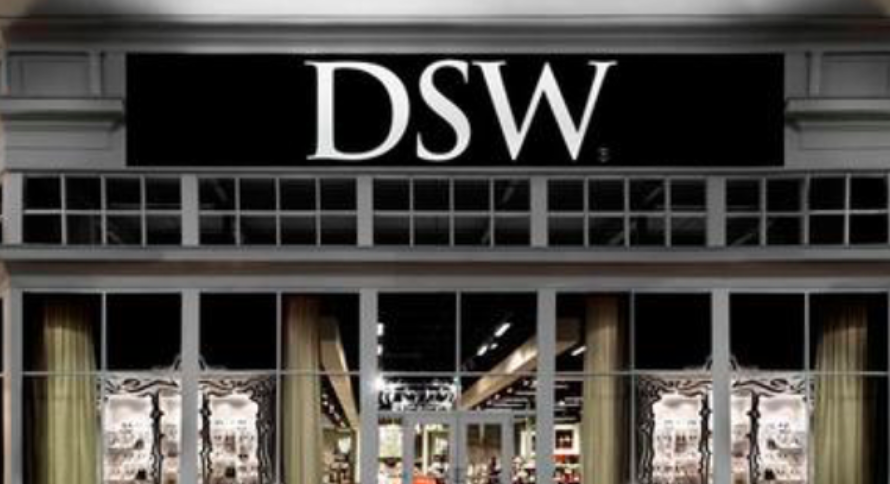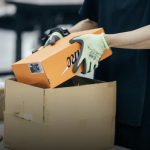Capitalizing by being able to chase stronger-than-expected demand for cold weather boots, DSW Inc. delivered fourth-quarter earnings that beat plan, enabling the off-pricer to show its first year of adjusted earnings growth since 2013.
For the fourth quarter ended February 3:
- Sales increased 6.7 percent to $720.0 million, including $35.6 million from an extra week in the period.
- Comparable sales increased 1.3 percent compared to last year’s 7.0 percent decrease.
- Gross margins increased 150 basis points to 26.5 percent, driven by favorable sourcing, lower markdowns and occupancy leverage.
- Operating expenses improved 20 basis points to 21.3 percent, driven by tighter expense management, partly offset by higher incentive compensation.
- Reported net income fell 61.7 percent to $11.7 million, or 15 cents per share, from $30.5 million, or 38 cents, a year ago. The latest year included net after-tax charges of $18.8 million, or 23 cents a share, related to Ebuys, restructuring, acquisition expenses related to Town Shoes and the impact of U.S. Tax Reform.
- Adjusted net income jumped 84.8 percent to $30.5 million, or 38 cents, from $16.5 million, or 20 cents, a year ago. Excluding the impact of the 53rd week of 6 cents per share, per diluted share, adjusted EPS increased 60 percent.
Earnings of 38 cents came in well ahead of guidance provided November 21 calling for earnings in the range of 26 to 31 cents. Wall Street’s consensus estimate had been 27 cents. In November, the off-price shoe chain lowered its guidance from a prior range of 31 to 41 cents due to lower expectations for Ebuys and the impact of weather-related disruptions in the third quarter.
For the full year, sales increased 3.3 percent to $2.8 billion. Comparable sales slipped 0.4 percent compared to the prior year’s 3.0 percent decrease. Reported net income fell 46.0 percent to $67.3 million, or 83 cents per share, after net after-tax non-recurring charges of $55.5 million, or 69 cents. Adjusted net income rose 2.2 percent to $122.8 million, or $1.52.
“Our strong fourth quarter results enabled us to exceed our revised guidance and achieve the expectations,” said Roger Rawlins, CEO, on a conference call with analysts.
He noted that positive footwear comps were seen at Designer Shoe Warehouse for the third quarter in a row while the company saw its strongest growth in digital demand in the last nine years.
Jared Poff, CFO, added, “Better execution across several areas drove strong holiday results; we successfully chased demand for certain categories while keeping inventory levels lean and current. Our boot strategy maximized strong demand for seasonal footwear through the effective use of pre-buys and receipt management. Our exciting “No-Wrong Way to Holiday” campaign engaged customers and drove the highest increase in purchase frequency among new and repeat customers this year.”
He said its redesigned website continues to boost customer conversions, particularly on mobile devices. Said Poff, “Our warehouse network played a critical role in fulfilling the surge in online demand this holiday, with local warehouses going over 40 percent of digital demand this quarter.”
Footwear comps increased in the low-single-digits in the quarter, led by the women’s category, which posted a low-single-digit comp growth. Despite the delay due to warm weather earlier in the year, the seasonal business exceeded its plan and also posted a low-single-digit comp increase. Pre-buy and higher open-to-buy liquidity enabled DSW to chase demand for fast-selling items, particularly cold weather boots.
Added Poff, “We also experienced healthy demand in the athleisure business before colder temperatures set in, validating the direction we are taking for 2018.”
Men’s comped down in the low-single-digit range, with growth in seasonal athleisure and casual footwear. The men’s business has been reset with a differentiated assortment this spring that’s expected to drive a continued improvement this year.
Kids has expanded to over half of the fleet and phase 1 stores are posting comp growth on their second year. Said Poff, “We’ve determined how to best expand DSW Kids for the rest of our fleet and will establish a national presence by the back-to-school season.”
Accessories comped down in the high-single-digits in the quarter, as an SKU rationalization was completed.
Transactions increased in the mid-single-digits in the quarter while a single-digit increase in AUR was more than offset by lower UPT.
Fourth quarter gross margin came in significantly better than planned, up 260 basis points at the DSW segment. Effective clearance management, along with sourcing improvements and occupancy leverage, offset shipping expenses and marketing promotions. The overall margin was impacted by Ebuys and the closing of franchised shoe locations inside Gordmans.
Excluding inventories from Ebuys and Gordmans, inventory per square foot increased 6 percent with just arrived goods accounting for three quarters of this increase, and the balance representing the increase in productive on-hand inventory. DSW is positioning 2018 to return to a more normalized inventory level in key categories while also funding the roll-out of Kids to the remainder of the fleet. On a two-year basis, inventory per square foot declined 2 percent.
Regarding its exit from Ebuys, Poff said the challenge of sourcing the right merchandise in a sustainable way and the requirements to scale the business entailed unacceptable economics in the near-term. Inventories are being liquidated and the business will be wound down by mid-2018. Said Poff, “Although we are disappointed by this outcome, our brief ownership has given us enormous insight into online marketplaces, which will inform future potential decisions around leveraging our industry-leading digital platforms to compete with traditional retail and direct-to-consumer models.”
On the call, Rawlins outlined four key areas of investment in 2018:
- People: Changes in labor scheduling is expected to better match associates to key selling periods in order to improve engagement and customer conversion. Associate incentive compensation has also been realigned to focus on key strategic and financial goals.
- Product: Part of the improvements being seen in its Power 35 stores are directly related to increased freshness, having the “right brands” and more localized content, and those learnings will be extended to the rest of the chain. A greater portion of open-to-buys will be spent this year in its top-growing categories: Athleisure and Kids. Increased inventory investments will also be made in seasonal, a category that has operated on reduced inventory the last two years. Buys will be reduced in “underperforming and over-distributed resources” while increased emphasis will be placed on better sellers, including some of its excluding brands. The “wide space in fashion and modern comfort” will be a focus this spring.
- Marketing: DSW’s rewards program will be relaunched and include points for shoe donations and repairs, as well as birthday rewards to special friends and family. Targeted marketing will also be a focus. Said Rawlins, “Given the wealth of customer and product data from our loyalty program we are working to understand how to optimize customer re-targeting, pricing and markdown management with new technology such as artificial intelligence.”
- Innovation: A new store design featuring a dramatic expansion of its assortment and new services like shoe repair and nail salon has delivered a significant comp lift in the last 12 months. Five more locations this year will feature the new design. Shoe repair will be added to more stores and a new service concierge where customers can find shoe repair, order, pick up, return and exchang at a central location will debut. Said Rawlins, “We’re also working to develop a technology platform that will further speed up associate engagement with a future point of sale system that will integrate our inventory rewards and operational databases on a seamless mobile interface. We expect to pilot this technology this year.”
For the current year, DSW expects full-year revenue growth to decrease by 1 percent to 3 percent, with the exit of non-core businesses and the impact of the 53rd week. Excluding the exit of non-core businesses and the 53rd week, total revenues are expected to increase in the 2 percent to 4 percent range. This assumes comparable sales increase in the low single digit range and the opening of three to six net new locations for the DSW Segment.
Full year adjusted EPS is expected to range between $1.52 to $1.67 per diluted share, representing earnings growth of 4 percent to 14 percent excluding the income from the 53rd week. The company’s outlook assumes a tax rate of 29 percent compared to its historical rate of 39 percent.
Photo courtesy DSW
















